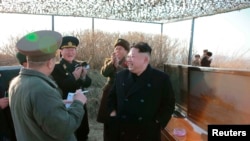North Korean leader Kim Jong Un’s sudden cancellation of a tentative trip to Moscow is not likely to affect overall relations between Moscow and Pyongyang, experts say.
On Thursday, Russian President Vladimir Putin’s spokesman, Dmitri Peskov, told reporters that Kim would not be attending Russia’s Victory Day ceremony next month, which will mark the 70th anniversary of Russia’s victory over Nazi Germany in World War II. Moscow was notified of Kim’s decision through “diplomatic channels,” according to Peskov. The spokesman said Pyongyang told Moscow it had to cancel the trip because of “internal affairs.” He did not elaborate.
The North Korean move came as a surprise. The Kremlin had confirmed Kim's acceptance of the invitation to the May 9 event in Moscow several times. North Korea, however, had never commented publicly on the trip.
Some experts noted the possibility that the internal affairs that prevented Kim from leaving the country could be related to the regime’s stability.
John Merrill, former chief of the Northeast Asia Division of the Bureau of Intelligence and Research at the State Department, said it appeared that Pyongyang had planned the trip.
“They clearly were displaying they had the capability to make such a trip, and I guess they did give a positive response to the Russians, but then he decided not to go,” Merrill said in a phone interview with the VOA Korean service.
Others cited Beijing, Pyongyang’s main ally, as a possible reason for the cancellation. Joseph DeTrani, former director of the U.S. National Counterproliferation Center in the Office of the Director of National Intelligence, said he was not surprised that Kim canceled the trip. The former intelligence official said it would have been difficult for Kim, who is not known to have visited a foreign country since he took power in late 2011, to choose Moscow over Beijing as his first foreign country to visit.
“Given the close relationship North Korea has with China, the first foreign visit should be to China,” said DeTrani.
DeTrani said it was unlikely that Kim’s decision would have any impact on relations between Moscow and Pyongyang.
Georgy Toloraya, director of Korean programs at the Institute of Economy at the Russian Academy of Science, agreed.
“This was not supposed to be a bilateral visit," he said, nor was the cancellation meant to express disapproval — a reference to some European countries' decision to boycott the event because of Moscow’s annexation of Crimea and its role in the conflict in eastern Ukraine.
Moscow said more than 20 world leaders, including Chinese President Xi Jinping, are expected to attend the ceremony. South Korean President Park Geun-hye will send her aide to the event. The United States will be represented by its envoy to Moscow.











